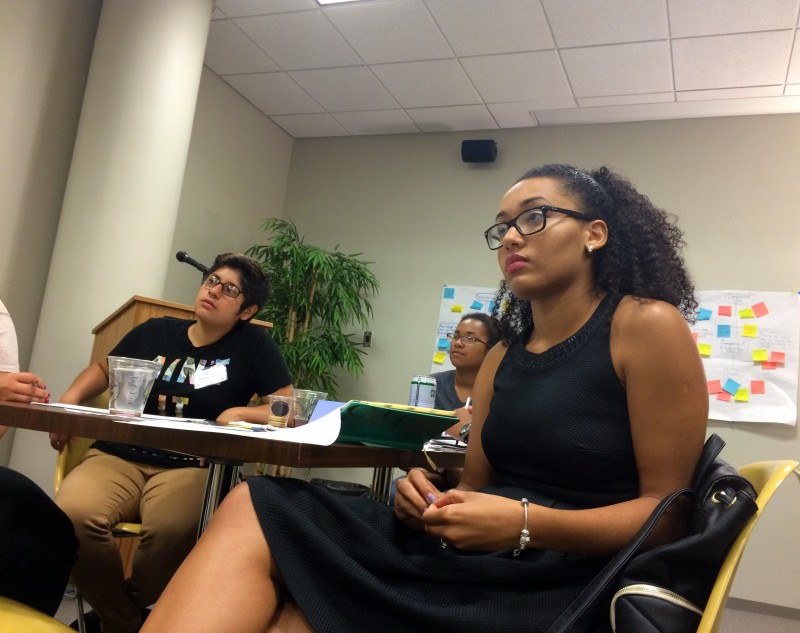
First-generation students in New York City. A February 2018 report found that, nationwide, those who earn a bachelor’s degree are likely to earn the same paychecks as their peers who had more educated parents.
Economists have been finding that it’s getting harder to move up in America. Kids who come from poor families are more likely to remain poor as adults than in the past. But data released from the statistics division of the U.S. Department of Education earlier this month points out that a college education can still be a lever of social mobility. Even college graduates whose parents had never attended any college at all were still working at the same rates and earning the same salaries, on average, as their peers with better-educated parents.
Consider students who graduated from college with a four-year bachelor’s degree during the 2007-08 academic year. Five years later, in 2012, the majority of these young college graduates had full-time jobs. For those whose parents had never attended any college, often referred to as “first-generation” students, 57 percent were working full time and earning $45,000 a year, on average. For those who had at least one parent who had attended some college, 58 percent were working full time and earning $43,000. And for those who had at least one parent with a college degree, 59 percent were working full time and making $45,500. From a statistical perspective, these rates and salaries are identical, according to the February 2018 report produced by RTI International, a nonprofit research institute, for the National Center for Education Statistics (NCES).
“It’s partially good news. It doesn’t matter who you are as long as you hold a diploma in your hands,” said Ray Franke, a professor at the University of Massachusetts Boston. “For the few [first-generation students] who make it through the pipeline, chances are they can progress just like their peers and lead a successful middle-income life.”

This story also appeared in U.S. News & World Report
But the report wasn’t all good news; it also highlighted how first-generation students are less likely to take challenging, college-preparatory classes in high school. Afterward, first-generation students enroll in college in smaller numbers. And when they get to college, they’re more likely to drop out without a degree. “We’re also perpetuating inequality,” added Franke.
The report’s findings came from an analysis of three different national surveys that followed almost 50,000 students from high school onward. Students’ transcripts show that the problem for first-generation students starts well before college. Only 16 percent of first-generation students took an academically rigorous high school curriculum that includes at least four years of English, three years of math, three years of science and two years of a foreign language. Among students who had a least one parent with a bachelor’s degree, 37 percent did.
Nearly 36 percent of undergraduates who began college in 2003-04 were students whose parents had never attended college at all. But four years later, in 2007-08, only 20 percent of all bachelor’s degree recipients were first-generation students. Franke’s previous researchfound that most of them drop out during the first year of college for a combination of academic problems and money woes.
It’s unclear from the current data if the dropout rates for first-generation students are improving or worsening. Separate researchfrom the Pell Institute, a nonprofit research organization, has found a widening gap in college graduation rates between wealthier and poorer students.
The February 2018 report noted that the proportion of first-generation students enrolled at universities had declined to 33 percent in 2011-12 from 37 percent in 1999-2000. Part of that decline is because Americans are becoming more educated and more high school students now have at least one parent who has attended college. But it’s also likely that rising tuition and living expenses have dissuaded many first-generation students from enrolling. That figure reflects dropout rates, too. The decline in first-generation college students could result from a combination of all these factors.
For first-generation students who do succeed, it is still unknown whether they will continue to earn the same salaries as their wealthier and more privileged peers. “This is early career income,” said Linda DeAngelo, a professor at the University of Pittsburgh who co-authored the 2016 first-generation study with Franke.”We don’t know about the types of positions that these students are in and if there’s a different trajectory for their earnings.”
Indeed, many young adults from privileged families may start in low-paid jobs in their 20s before finding a more lucrative career. Others will leave the labor market to go to graduate school and eventually boost their earnings power even more. Students from low-income families might not continue to keep up with these high-earning peers.

